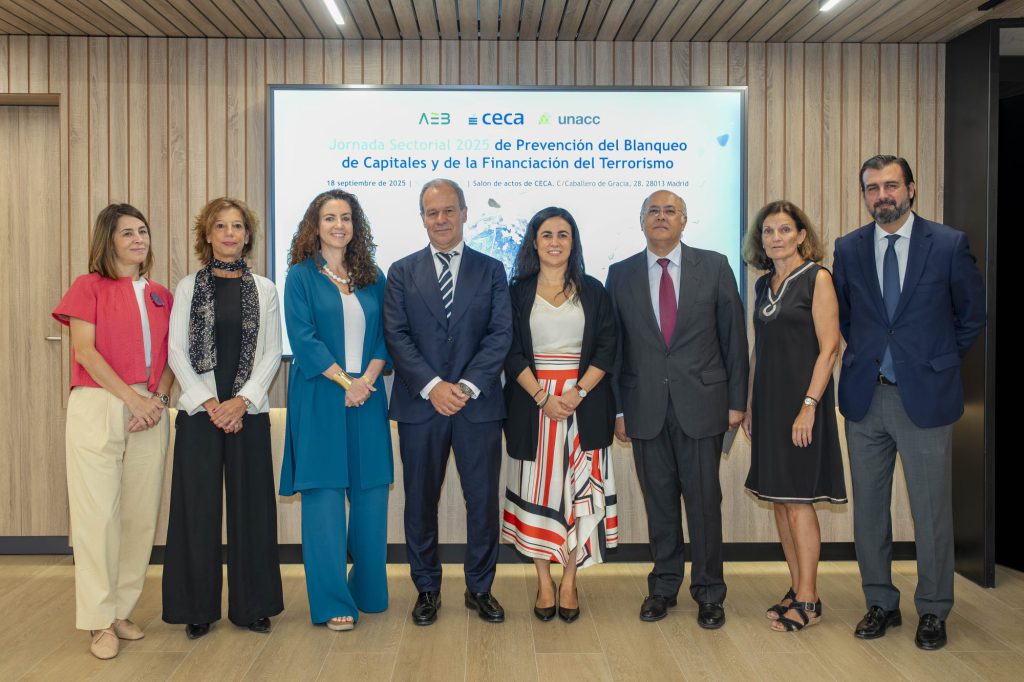AEB, CECA and UNACC, in collaboration with Sepblac, hold the eighth Sectoral Conference on Anti-Money Laundering and Countering the Financing of Terrorism
It covers the recent agreement between the ECB and the AMLA, which establishes a structured framework for cooperation and the exchange of information
The annual meeting brought together leading representatives from the Directorate-General of the Treasury and Financial Policy, Sepblac, credit institutions, and sectoral associations
The credit institution associations AEB, CECA and UNACC, in collaboration with Sepblac, have held the eighth Sectoral Conference on Anti-Money Laundering and Countering the Financing of Terrorism, which brought together leading experts on the topic, as well as representatives from supervisory bodies and the main regulatory authorities.
The meeting, held at CECA's headquarters in Madrid, was marked by the recent agreement between the European Central Bank (ECB) and the European Anti-Money Laundering Authority (AMLA), which establishes a structured framework for cooperation and the exchange of information to strengthen supervision in the area of anti-money laundering and avoid the duplication of efforts.
This agreement exemplifies how coordination between the public sector and collaboration with private banks strengthens a more effective system in the fight against money laundering and the financing of terrorism (AML/CFT). In this context, Spanish financial institutions stand out for their rigour and commitment to regulatory compliance, as well as for their active cooperation with the competent authorities, an effort that has received recognition from specialised international organisations.
The event brought together key representatives from credit institutions belonging to the organising associations, all of whom specialise in AML/CFT. They discussed the latest regulatory developments, new risk typologies, and emerging trends in the field of money laundering.
The meeting was opened by Lourdes Jiménez Ramos, Deputy Director General of Inspection and Control of Capital Movements at the Treasury, who highlighted the challenges that the private and public sectors will have to face together in the coming months. She highlighted the adaptation of the institutional and regulatory framework, with the launch of AMLA, as well as the mutual evaluation of the Financial Action Task Force, which will begin in 2026 and test the state of the Spanish preventive system. AMLA Vice President Juan Manuel Vega Serrano gave a presentation on the new European authority and presented a strategic roadmap to strengthen anti-money laundering supervision and assist in the coordination of financial intelligence.
This was followed by three panel discussions devoted to supervision, financial intelligence and new regulatory developments, respectively, involving representatives from both the public and private sectors.
The first of the panels, dedicated to new developments in supervision and inspection, was moderated by Raquel Cabeza, Corporate Director of Risk and Compliance at CECA. Speakers included Alejandro Valiñas, head of the Financial Institutions Inspection Division at Sepblac, and Juan Casillas, head of the Banking, Insurance, and Securities Inspection Unit at the same organisation. Both presented the conclusions drawn from the most recent inspections, as well as the findings detected and the upcoming challenges for the future inspection plan, highlighting the importance of coordination between national and European supervisors in a scenario in which the new AMLA authority is beginning to assume powers.
The second panel discussed the most relevant developments and typologies in the field of financial intelligence. The debate was moderated by Cristina Freijanes, Secretary General of UNACC, and featured the participation of Juan Carlos Calleja, Head of the Strategic Intelligence Division at Sepblac; Guillermo Yubero, inspector of the National Police in the Central Brigade of Financial Intelligence attached to Sepblac; David Saludes Moronval, Director of Regulatory Compliance at Ibercaja Banco, and Luis Francisco Luján Moralejo, Head of Financial Crime Compliance at Banco Santander. The speakers shared their experience with emerging types of money laundering and illicit financing, highlighting the role of public-private cooperation and the need for innovative tools to detect suspicious transactions, such as new reporting of mule accounts and fraud.
Finally, the third panel was moderated by María Peco, Senior Advisor for Legal Affairs and Anti-Money Laundering at AEB. Participants included Irene Sánchez, advisory member of the General Secretariat of the Treasury and International Financing of the Public Treasury; Belén Álvarez, an AML/CFT expert from the Non-Financial Inspection Division and Technical Secretariat of Sepblac, and Gemma Serrano Villajos, from the Anti-Money Laundering Unit of Caja Rural del Sur. The main purpose of the panel was to explore some of the changes introduced in the recent update of European Union and international regulations, and how these impact the national and organisational levels.
The day concluded with a presentation by Pedro Comín, director of Sepblac, who highlighted the contributions made during the panel discussions, and emphasised the importance of maintaining a solid framework for cooperation between supervisors, authorities, and financial institutions.








